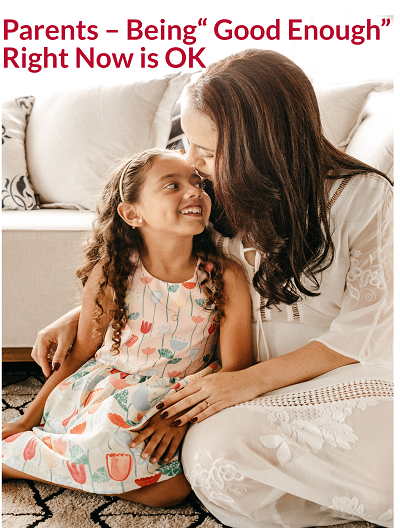Parents - Being "Good Enough" Right Now is OK
Parents - Being "Good Enough" Right Now is OK

Parents can't be constant companions, teachers or saints at this time. You can be enough.
- It’s not possible to be a really good parent now - aim for good enough for you and your kids.
- Do what you can - be calm as much as you can - and apologize when you can’t.
Kids will remember this as a boring time but kids love time with their parents. They will remember the extra time spent with parents - even your teens.
There are just a few things that you probably can do that will help both you and your kids feel better and cope better. Many parents I am sure are overwhelmed with the number of ideas and suggestions out there. Here are just a few suggestions.
Keep Familiar Routines
Everyone is saying this when nothing is routine.
But even if you let everyone sleep in an extra hour, do breakfast and morning routine as usual.
Post and review the day's schedule each day. Some work time in morning when fresh - then some exercise, regular meals, and some movie/screen and activity time. Schedule screen start and end times.
Keep usual bedtimes – parents need the time for themselves at the end of the night and kids need their usual sleep.
Call or video-chat with grandparents, uncles, aunts, neighbors, etc. or other important people in your family’s lives – it will be helpful for all parties.
That metaphor of taking care of yourself first is even more important now than ever.
If you are a 2-parent household check with each other on important needs for day both work and time to exercise and be alone.
If you are a single parent, try to create time for you to be alone and debrief. It is ok unless your children are really young. This is a necessary time to preserve privacy for everyone and it's ok to insist that it happen.
Put a quiet zone sign on your door. Go to the bathroom if you have to. Use the kid movie time to lie down, be alone, or call a friend.
Kids really like to help. Teach them now even if it takes time. Older kids could learn how to prepare meals and do laundry - together with you or alone. Kids of all ages like to help - make a mess it does not matter. Really - ask your teens and kids to help out the family during this time.
Fitness activities by age 4-12. Check out: https://www.neoufitness.com/concepts/neo-kids
Walk outside and take time to look at plants, bugs and throw a rock.
Get out the Wii – share family/kid memories.
Just dance - different family members each pick a song. There is always YouTube.
Engagement and learning is more important than worksheets and facts now.
Most schools are working to provide online instruction and some form of a schedule. Check out:
Currently they have schedules for the day to guide you for each grade and engaging, interactive academic activities for all ages.
Meditation - Everyone Thinks They Should Do More and It Will Help
Kids and teens are mostly willing to try if you do it together - and you show them how it works.
Everyday check-ins re senses- what 3 things do you see or hear or smell.
Bedtime is a great time for meditation because you're lying still. Give your stuffed animal a ride on your belly.
There is a way to calm down. Breathe in a little and breathe out a whole lot.
Show them how you use meditation to help you:
- Shake up a snow globe.
- This is mommy’s mind now so I can’t think well
- I need your help.
- Let’s watch the snow fall together.
- And see if it helps us feel better.
- Check out: https://www.susankaisergreenland.com/mindfulness-for-kids-
Feeling crafty? You can even make your own globe!
Read, Read, Listen, and Write
Kids develop language skills by parents reading with them or reading to parents. Then ask kids a few questions: What is going to happen next? What does that character feel?
- Suggest kids pull out and read recent and old favorite books
- Authors are reading their books online each day – Storyline Online
- Libraries that are closed have a lot of e-books to borrow
- Podcasts: 25 best podcasts for kids
As a family you can create your own written or drawn gratitude journals. It's possible to find small things to appreciate - even in crisis (cup of coffee, playing a game with brother, talking to a friend). You can all write together briefly after dinner.
__________________________
A good overall resource for parents that offers helpful articles is ChildMind.org.












